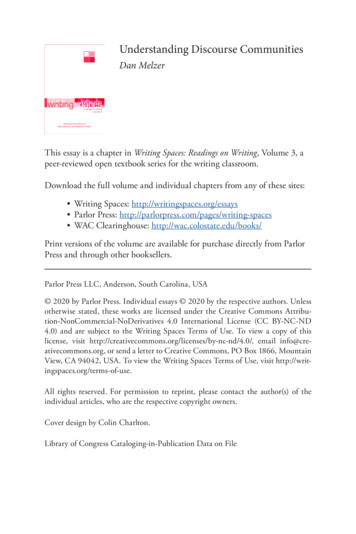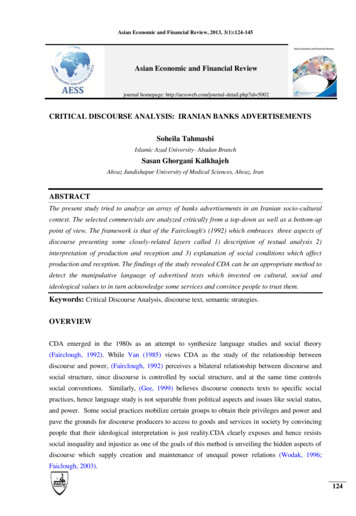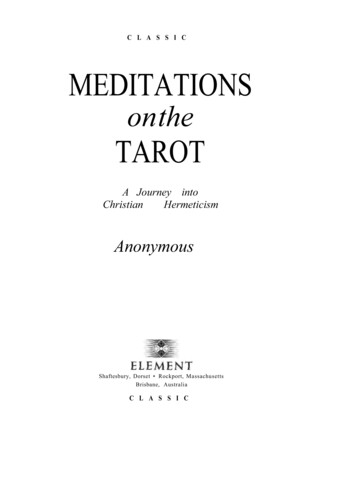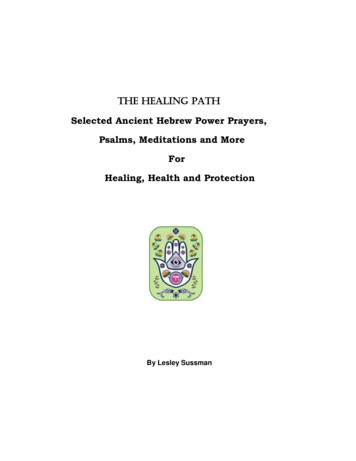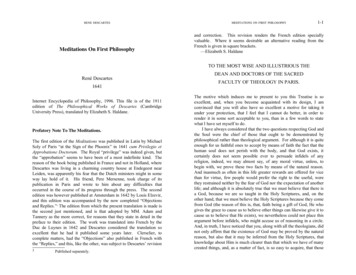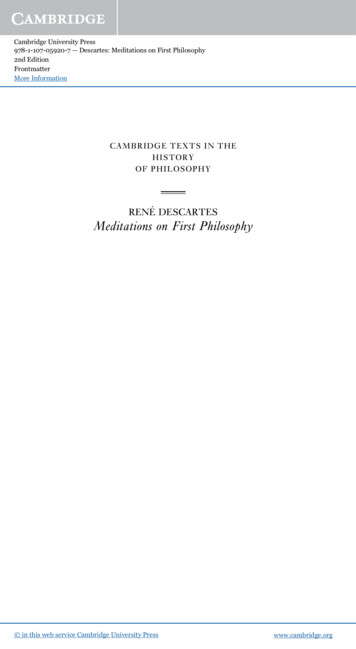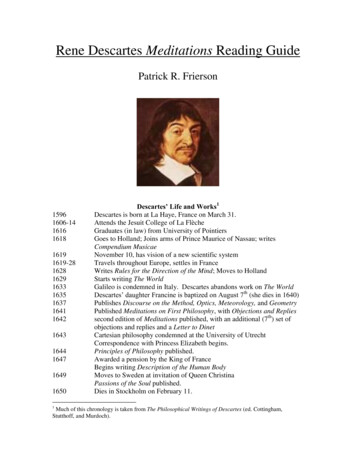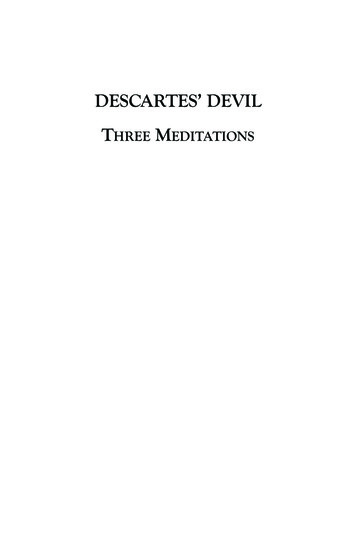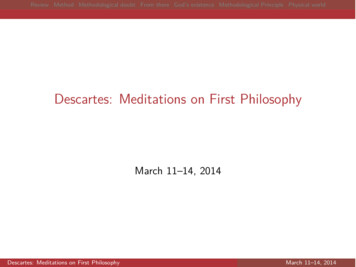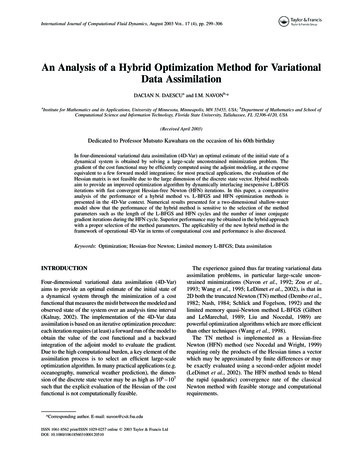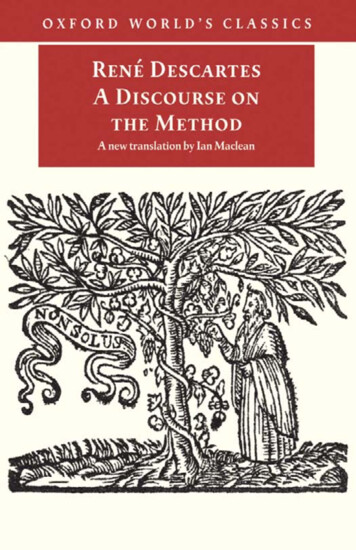
Transcription
R D was born at La Haye near Tours on March . He was educated at the Jesuit Collège de la Flèche in Anjou, andat the University of Poitiers, where he took a Licenciate in Law in . Two years later he entered the army of Prince Maurice of Nassauin Holland, and met a local schoolmaster, Isaac Beeckman, whofostered his interest in mathematics and physics. After furthertravels in Europe he settled in Paris in , and came into contactwith scientists, theologians, and philosophers in the circle of theMinim friar Marin Mersenne. At the end of Descartes left forHolland, which he made his home until ; he devoted himself tocarrying forward the mathematical, scientific, and philosophicalwork he had begun in Paris. When he learned of the condemnationof Galileo for heresy in , he abandoned his plans to publish atreatise on physics, and under pressure from his friends consented tohave the Discourse on the Method printed, with three accompany-ingessays on topics in which he had made discoveries. In hisMeditations appeared, setting out the metaphysical underpinnings ofhis physical theories; these were accompanied by objections writ-tenby contemporary philosophers, and Descartes’s replies to them. Hiswritings provoked controversy in both France and Holland, wherehis scientific ideas were banned in one university; his works, however(including the Principles of Philosophy of ) continued to bepublished, and to bring him notoriety and renown. In heaccepted an invitation from Queen Christina of Sweden to settle inStockholm; it was there he died of pneumonia on February .
’ For over years Oxford World’s Classics have broughtreaders closer to the world’s great literature. Now with over titles––from the , -year-old myths of Mesopotamia to thetwentieth century’s greatest novels––the series makes availablelesser-known as well as celebrated writing.The pocket-sized hardbacks of the early years containedintroductions by Virginia Woolf, T. S. Eliot, Graham Greene,and other literary figures which enriched the experience of reading.Today the series is recognized for its fine scholarship andreliability in texts that span world literature, drama and poetry,religion, philosophy and politics. Each edition includes perceptivecommentary and essential background information to meet thechanging needs of readers.Ian Maclean is Professor of Renaissance Studies at the University ofOxford and a Senior Research Fellow of All Souls College. Among hispublications are The Renaissance Notion of Woman ( ,frequently reprinted), Meaning and Interpretation in theRenaissance: The Case of Law ( ), Montaigne philosophe ( ),Logic, Signs and Nature in the Renaissance: The Case of LearnedMedicine ( ), and an edition of Cardano’s De libris propriis ( ).
OXFORD WORLD’S CLASSICSRENÉ DESCARTESA Discourse on the Methodof Correctly ConductingOne’s Reason andSeeking Truth in the SciencesTranslated with an Introduction and Notes byIAN MACLEAN1
3Great Clarendon Street, Oxford Oxford University Press is a department of the University of Oxford.It furthers the University’s objective of excellence in research, scholarship,and education by publishing worldwide inOxford New YorkAuckland Cape Town Dar es Salaam Hong Kong KarachiKuala Lumpur Madrid Melbourne Mexico City NairobiNew Delhi Shanghai Taipei TorontoWith offices inArgentina Austria Brazil Chile Czech Republic France GreeceGuatemala Hungary Italy Japan Poland Portugal SingaporeSouth Korea Switzerland Thailand Turkey Ukraine VietnamOxford is a registered trade mark of Oxford University Pressin the UK and in certain other countriesPublished in the United Statesby Oxford University Press Inc., New York Ian Maclean 2006The moral rights of the author have been assertedDatabase right Oxford University Press (maker)First published as an Oxford World’s Classic paperback 2006All rights reserved. No part of this publication may be reproduced,stored in a retrieval system, or transmitted, in any form or by any means,without the prior permission in writing of Oxford University Press,or as expressly permitted by law, or under terms agreed with the appropriatereprographics rights organization. Enquiries concerning reproductionoutside the scope of the above should be sent to the Rights Department,Oxford University Press, at the address aboveYou must not circulate this book in any other binding or coverand you must impose this same condition on any acquirerBritish Library Cataloguing in Publication DataData availableLibrary of Congress Cataloging in Publication DataDescartes, René, 1596–1650.[Discours de la méthode. English]A discourse on the method of correctly conducting one’s reason andseeking truth in the sciences / René Descartes ; translated with anintroduction and notes by Ian Maclean.p. cm. –– (Oxford world’s classics)Includes bibliographical references and index.1. Methodology. 2. Science––Methodology. I. Maclean, Ian. II. Title.III. Oxford world’s classics (Oxford University Press)B1848.E5M33 2006 194––dc22 2005019297Typeset in Ehrhardtby RefineCatch Limited, Bungay, SuffolkPrinted in Great Britain byClays Ltd, St. Ives plc., SuffolkISBN 0–19–282514–3 978–0–19–282514–81
CONTENTSAcknowledgementsviIntroductionviiA Philosopher’s LifeviiiThe Genesis of the Discourse and its DevelopmentxxiiiGalileo, Mersenne, and the Church: Authority and Truth xxviiiThe Publication of the DiscoursexlThe DiscoursexlivPart Six: the Presentation of the ProjectxlvParts One and Two: Intellectual AutobiographyxlviiiParts Two and Three: Precepts in Philosophy and Ethics xlixPart Four: Metaphysics and EpistemologyliiiPart Five: Physics and PhysiologylviiiThe Essays Published With the Discourse: Dioptrics,lxMeteorology, GeometryDescartes As a WriterlxiiiEnvoi: The Cartesian Philosophical EdificelxixNote on the TextlxxiSelect BibliographylxxiiA Chronology of René DescarteslxxivA DISCOURSE ON THE METHODPart OnePart TwoPart ThreePart FourPart FivePart Six Explanatory Notes Index
ACKNOWLEDGEMENTSI should like to record my gratitude for the kind assistance I receivedfrom the following colleagues and friends: Robin Briggs, JohnCottingham, Dan Garber, Noel Malcolm, Michael Moriarty, andRichard Parish. I am also very grateful for the support andencouragement I received from Judith Luna of Oxford UniversityPress.
INTRODUCTIONThe publication in of an anonymous book in French entitled ADiscourse on the Method of Correctly Conducting One’s Reason andSeeking Truth in the Sciences marks one of the pivotal moments ofWestern European thought; it was the work of a formidably clever,radical, rigorous thinker, who in this short, informally presentedintroduction to his work threatened the very foundations of manyprevailing philosophical beliefs, and set an agenda for enquiry intoman and nature whose effects have lasted up to the present day. Inthis introduction to his thought, Descartes set out his novel philosophical and ‘scientific’1 programme, and prepared his contemporaries to receive it, even though they would be looking at it through theprism of their intellectual expectations, which (for the learnedamong them) had been formed in the traditional framework of Aristotelian philosophy and its characteristic modes of debate. It is, ofcourse, impossible fully to re-create the sense of reading a work forthe first time, especially one written so long ago, and in so different acultural climate; as Bernard Williams pointed out in , we canplay seventeenth-century music from seventeenth-century scores onseventeenth-century instruments, but we will hear it with twentiethcentury ears.2 But even though any attempt at reconstruction will bea pis aller, I shall nonetheless adopt a historical rather than timelesslyphilosophical approach to the text, and seek to place it in contexts1I shall use ‘science’ and ‘scientific’ in this introduction to designate what Descarteswould have known as ‘natural philosophy’, that is, the pursuit of causal knowledge in theinvestigation of nature. While it is generally agreed that the map of disciplines was verydifferent in Descartes’s time from what it is now, there has been much recent debate asto whether a continuity can be perceived from the natural philosophy of the seventeenthcentury to modern science; by the use of inverted commas, I intend to signal a potentialanachronism, but not to take a side in this debate, for an account of which see EarlyScience and Medicine, ( ). The numbers in brackets throughout the Introductionrefer to volume and page in the standard edition of the complete works of Descartes byCharles Adam and Paul Tannery, vols. (Paris, ): hereafter referred to as AT inthe text and notes.2Descartes: The Project of Pure Enquiry (Harmondsworth, ), .vii
which reveal something of its early impact. I have not attemptedcomprehensively to cover the whole range of meanings which havebeen attributed to the Discourse; my aim is to set it in the contextof the life of its author, to give some inkling of what Descarteshimself was setting out to achieve by its publication, to indicate howhe came to put its various components together and make it availableto the public, and to suggest what its first readers might have madeof it.A Philosopher’s LifeRené Descartes was born on March at a village called LaHaye in the French province of Poitou (a token of his posthumousprestige was its renaming as La Haye-Descartes in ; since his birthplace has been known just as Descartes). His father was amagistrate in Brittany; through his profession he possessed thestatus of nobility, being a member of the so-called ‘noblesse de robe’.This class was resented by the old military nobility (the ‘noblessed’épée’), who looked on lawyers as little more than pen-pushers;but those who enjoyed the status set great store by it. They were notabove inflating their claims to aristocracy by acquiring lands whichconferred on them titles (‘terres nobles’), and even putting onmilitary airs; such was the case with the otherwise admirablyunpretentious Michel de Montaigne ( – : a figure important toDescartes in more than one way, as we shall see), whose grandparents were merchants, whose father was an army officer, and yetwho felt able to boast that he was the ‘scion of a race famous for itsmilitary valour’. On both sides of his family, René’s forebears hadbeen doctors and lawyers, prosperous enough to acquire ‘terresnobles’ for members of their families. René’s title, which he useduntil his mid-twenties, was du Perron: he was known by this title byhis Dutch acquaintances in the early s. The sense of statuswhich this background gave him was a motivating force in his laterlife.33See Ellery Schalk, From Valor to Pedigree: Ideas of Nobility in France in theSixteenth and Seventeenth Centuries (Princeton, ); Montaigne, Essais, ed. Pierreviii
As Descartes tells us himself, he was a sickly, pale-complexionedchild, who suffered from a dry cough (AT . – ); he was broughtup in his grandmother’s house, his father being absent in Brittany,having remarried in . In he was sent away from home to beeducated, to the newly founded Collège de la Flèche; this was aJesuit school, which like others of its kind was established to servethe needs of the professional classes and nobility, as well as to produce Jesuit priests and missionaries. Its second principal, FatherÉtienne Charlet ( – ), was related to Descartes’s mother’sfamily. Perhaps through this connection, and because of his delicateconstitution, a concession was made: René was allowed to get uplater in the morning than the other pupils, a practice to which headhered for much of his life (in contrast to the ascetic and exactingregime of contemporary scholars, who often rose in the early hours,worked by feeble candlelight, and ruined both their eyesight andhealth in the process).The Collège had an impressive and rigorous curriculum, whichincluded the university arts course (the so-called trivium of grammar, logic, and rhetoric, and quadrivium of arithmetic, geometry,music, and astronomy), which was taught as a preparation fordegrees in the higher faculties of theology, law, and medicine. Thiscurriculum had been codified and published by the Jesuits in ,in its Ratio studiorum: it integrated what are now known as thehumanities (classical literature, history, drama, and so forth) withscholastic philosophy and theology. The Ratio had all of the benefitsand all of the defects of such codifications; while it set high standards, it also discouraged innovation, especially in the investigation ofnatural philosophy. Descartes provided an account of the curriculumin the Discourse: he was given a thorough grounding in ancient languages and literatures, grammar, logic, and rhetoric, and instructedin scholastic natural philosophy, mathematics, metaphysics, and ethics. Descartes reacted very differently to these two components. Onthe one hand, he commented adversely on the logic and philosophyVilley (Paris, ), . , p. : ‘la fortune m’a faict naistre d’une race fameuseen preud’homie’; for use of the title du Perron, see Isaac Beeckman, Journal à , ed. Cornelis de Waard, vols. (The Hague, – ).ix
he was taught, with its rebarbative vocabulary, inelegant syntax, andold-fashioned forms of writing and learning (disputations and‘quaestiones’), although it should be pointed out that he did notentirely lose his taste for it: one or other of St Thomas Aquinas’s twovoluminous theological Summas was a book he took with him––another being the Bible––when he moved to Holland from Paris inthe late s. On the other hand, the strong emphasis on humanistic learning and elegance of expression was to turn him into astylish and fluent writer of Latin. Jesuit schools have long beenassociated with the claim: ‘give me the child, and I will give you theman.’ In the atmosphere of Counter-Reformation Europe, it mightwell be thought that this would entail the inculcation of an intransigent religious outlook founded on unswerving obedience to theRoman Church. There is clear evidence, as we shall see, that Descartes was very reluctant to be seen to oppose this body, even whenhe secretly believed it was wrong, as in the case of the condemnationof Galileo. In this, he may even have kept in his mind the stricture tobe found in the Spiritual Exercises of the founder of the Jesuit order,St Ignatius Loyola ( ?– ): ‘to be right in everything, we oughtalways to hold that the white which I see, is black, if the HierarchicalChurch so decides it.’ He may indeed have heeded this advice overmatters of ‘science’, but he seems not to have taken from his schooling a personal hostility to Protestants; many became his friends and‘scientific’ colleagues, and he himself chose to settle in a Protestantcountry characterized by the relatively tolerant co-existence there ofvarious religious groups.4Descartes stayed at the school until ; he then went on to theUniversity of Poitiers, where, in , he took a Licentiate in Law(a higher degree, academically very nearly the equivalent of the4See Stephen Gaukroger, Descartes: An Intellectual Biography (Oxford, ), – (there are many biographies of Descartes, which all share a great deal of the samematerial; this one is very well documented); AT . (reference to the Bible and theSumma); St Ignatius Loyola, Ejercitios espirituales, cuarta semana, a regla, in Obrascompletas (Madrid, ), : ‘debemos siempre tener, para en todo acertar, que loblanco que yo veo, creer que es negro, si la Iglesia hierárchia assi lo determiná’; onDescartes’s strong reservations about disputations, see the preface to the French editionof the Principes, AT B. – . On Descartes’s view of the Netherlands as a place of ‘suchtotal liberty’, see AT . .x
doctorate). This was no doubt at the behest of his father, who mighthave hoped that he would follow him in his profession. He may alsohave studied medicine in these years; he appears at some stage tohave acquired some skill in dissection. He did not, however, take upthe law, but instead went to Holland in , where he joined thearmy of the Protestant Prince Maurice of Nassau. It is not knownwhat role he fulfilled in the armies to which he was attached: hisbiographer Adrien Baillet ( – ) suggests it was that of engineer, involved with military architecture and fortifications, but hemight equally have undergone a form of training as a gentlemansoldier. This was not a surprising choice of career for a member ofthe minor nobility (nor was it unusual to join armies representingconfessional interests other than one’s own, providing that there wasno clash of national interest); throughout his life Descartes was toremain conscious of his status as a gentleman, and some of hisattitudes to scholarship and publishing are tinged with an aristocratic disdain for trade. Through his inheritance from his mother,who had died in , he eventually acquired an annual income.This was assessed by one of his early biographers at about , – , livres: a modest sum, but sufficient to ensure independentliving, provided that one avoided too many extravagances. Descartesseems to have been naturally frugal; he did not maintain a largeretinue, ate and drank in great moderation, dressed in a sober fashion, and avoided socializing––to which, in any case, he was littledrawn: on May he confided to his friend Jean-Louis Guez deBalzac ( – ), in a letter (AT . ), that in Amsterdam hepaid no more attention to the people he met than he would to thetrees on his friend’s estate and the animals that browsed there.There is no indication that he suffered financial difficulties until thelast few years of his life. Baillet suggests that he was actually richerin the late s than ever before, but his behaviour seems to indicate the reverse; he speaks in letters for the first time of beingwilling to accept patronage (to Hector-Pierre Chanut, November , AT . ), something which he had steadfastly refused tocontemplate up to then.While in Breda in he met a schoolmaster and mathematician,Isaac Beeckman ( – ), who was to be one of the formativexi
influences on his intellectual development. Until he was infairly regular contact with Beeckman; a significant cooling of theirexchanges then occurred, due to Descartes’s accusation that Beeckman had been boasting about what Descartes had learned from him,which led to the ungracious demand that the musical treatise he hadgiven to Beeckman as a present be returned. Although there was arapprochement, they never were as close friends again. This was notthe only time that Descartes was to fall out with close associates, onlylater to be partially reconciled with them. One of his biographersrefers to the years – as Descartes’s ‘apprenticeship withBeeckman’; in fact, Beeckman was not as good a mathematician asDescartes, but was more up-to-date with practical problems inmechanics, and better instructed in natural philosophy. They discussed (often with Beeckman supplying the question and Descartesthe answer) the nature of matter, mechanics, hydrostatics, optics,acoustics, and gravitation; from these exchanges Descartes composed his first work, a short treatise on music entitled Compendiummusicae, which was completed in December and presented toBeeckman.5In the meantime, Descartes had left the army of Maurice ofNassau and had joined that of the Catholic Elector Maximilian, dukeof Bavaria, in Germany, where he was present at the coronation ofthe Holy Roman Emperor Ferdinand II at Frankfurt in September . Later in that year he found himself in winter quarters, nearUlm according to some, or Neuburg according to others;6 and on November (as Baillet tells us), shut up in a stove-heated room, heexperienced three dreams which profoundly influenced the course ofhis life. He refers to these visions obliquely in the Discourse; but thedetails of the dreams were known only after his early papers werecirculated posthumously (AT . – ). He had spent the daymeditating on the ‘foundations of a wonderful science’, and it was inthe context of this ambitious and all-embracing project that heinterpreted his dreams. In the third of these, he was confronted with5Adrien Baillet, La Vie de Monsieur Descartes (Paris, ) . – (on income);Gaukroger, Descartes, – , – .6Geneviève Rodis-Lewis, Descartes: His Life and Thought (Ithaca and London, ), .xii
a pregnant question (a line remembered from the classical writerAusonius): ‘what road in life shall I follow?’ There have been manyattempts to explain the psychological processes revealed by hisaccount of this event: for some, it expresses a young man’s disquietabout the intellectual presumption implicit in his proposed enquiriesinto nature; for others, it is a sign of a nervous breakdown, or even abad migraine. It is noteworthy in respect of this early experience thatin his later published writings he never referred to dreams as bearersof spiritual messages, but considered them as no more than corporealin origin and subject to error; but there is one reference in a letter ofNovember to ‘following one’s inner inclinations’ (AT . )which may suggest that dreams could be taken seriously. If so, thepossibility might also be entertained that the event imbued him witha sense of a divinely inspired mission; it was his destiny to pursue the‘wonderful science’ and reveal it in due course to his contemporaries.He could not, of course, do this by referring to the heavenly directivehe had received in this numinous way, especially as he was put off byany whiff of occultism; the current vogue for alchemy and magic,with its obscure and secretive lore revealed only to initiates, repelledhim (AT . , . ). So the works he eventually published scrupulously exclude any reference to mysteries and to knowledge available only to initiates, and rigorously eschew all mental activitiesexcept those which could be ascribed to a thinker exploiting thenatural light of his reason.7Inspired by this vision, but also by work he had already begun, hecomposed over the next decade a work which was published posthumously with the title Rules For the Direction of Our Native Intelligence (Regulae ad directionem ingenii); this confirms that from an earlydate he was interested in formulating a general method for ‘scientific’ enquiry. His movements at this period of his life are difficult toascertain. It is not known when he ceased to be a soldier. Baillet tellsus that he returned to France in ; it is known that in May of thatyear he sold the property through which he held the title du Perron7Baillet, Vie, . ; Ausonius, Eclogarum liber, : ‘Quod vitae sectabor iter?’;Les Olympiques de Descartes, ed. Fernand Hallyn (Geneva, ); Gaukroger, Descartes, – .xiii
with its seigneurial rights; it seems likely that he set out for Italy atsome point in , and while there visited the shrine of Our Ladyof Loreto, which, according to one early biographer, he had solemnlyundertaken to do immediately after his dreams in (anotherindication, perhaps, if it is true, that he saw the dreams in terms of adivine directive). By he was again in Poitou, where he flirted forthe last time with the idea of taking up a legal career; he then travelled on to Paris, to remain there until . This was a tense time inthe capital: the vogue for allegedly lax morality among young gentlemen, connected with the production of libertine (in part obscene)literary works and publicly expressed indifference (if not worse) toreligion, had led to a number of thunderous denunciations of atheism and free-thinking, and the trial of the prominent poet Théophilede Viau ( – ). Descartes makes one brief reference to thisatmosphere and to the free philosophizing associated with it in aletter to Mersenne dated May (AT . ), and quotes once ina letter of February from a poem by Théophile (AT . );but there is no reason to believe that he ever was beguiled by freethinking, or to doubt the sincerity with which he upholds his ownpersonal religious belief and his determination to find arguments torefute deists and atheists.8He consorted in Paris with two former pupils of the Collège de laFlèche (although there is no evidence that he knew them while atschool): Claude Mydorge ( – ), a gentleman of leisure andindependent means, who like Descartes devoted himself to ‘scientific’ problems; and Father Marin Mersenne ( – ), a Minimfriar, who was already a well-published author on theology and itsrelation to natural philosophy, an implacable enemy of free-thinkers,and an indefatigable correspondent of the learned communitythroughout Europe. Until his death in , Mersenne was toremain Descartes’s mentor and principal contact in the capital. Hecame to know other important figures in the ‘scientific’, literary, andreligious communities, including Jean de Silhon ( – ), who,like him, was to write as a lay person on the soul; Father Guillaume8Gaukroger, Descartes, – ; Antoine Adam, Les Libertins au XVIIe siècle (Paris, ).xiv
Gibieuf ( ?– ), through whom he was later to seek acceptance by the theological community of Paris; the stylist and epistolarywriter Jean-Louis Guez de Balzac; a fellow mathematician andphysicist, Étienne de Villebressieu (d. ); the librarian and antiquary Gabriel Naudé ( – ); and Jean-Baptiste Morin ( – ), whose broad range of interests included astrology. In thesecircles he quickly obtained a reputation as a powerful and originalthinker; during his association with them, he discovered the sine lawof refraction in optics (which had been independently discovered byother mathematicians at about this time, and is now known as Snel’sLaw), and came to learn of Mersenne’s interest in mechanics and hismathematical approach to nature. He would also have heard discussed some of the most innovative modern thinkers, such as FrancisBacon ( – ), whose New Organon, or True Directions For theInterpretation of Nature (Novum organum, sive indicia vera de interpretatione naturae) had appeared in . He pursued the question ofthe certainty of mathematics, in order to warrant its use as a guidingdiscipline in physics; this seems to have led to disappointment on theone hand, and, on the other, a desire to extend the project of findingcertainty into a much broader field (a desire encouraged by theinfluential Counter-Reformation cleric Cardinal Pierre de Bérulle( – ), who had been present at a meeting at which Descartespowerfully refuted a proponent of chemical philosophy, and wasimpressed by him). By late he put into execution his plan toretire from Parisian intellectual life, stimulating though it was, andlive in the Netherlands, which was to be his home (with frequentchanges of address) for the next twenty years. It was there, in ,that he entered into a relationship with a maidservant known only toposterity by her first name, Helena; she had a daughter by him, bornon July , whom he recognized as his. The child’s death in seems to have caused much distress to Descartes. He alsoentered into contact with the Dutch diplomat and polymath Constantijn Huygens ( – ), who was to help him in his relationswith the Dutch court.9The broader project on which Descartes set to work (sometimes9On all the friends and contacts mentioned above, see Gaukroger, Descartes, – .xv
referred to by his correspondents as his ‘Physics’) was given by himthe title The Universe (Le Monde), and was to be an ambitiousaccount of the physical world on mechanistic principles. Most of twoparts of this work survived (the Treatise on Light and the Treatise onMan), and were found among his papers after his death; the thirdpart, on the soul, was not found, and may not have been written. Atthe same time, we learn from a letter which Guez de Balzac wrote tohim on March (AT . ) that he was planning an autobiographical essay entitled ‘the story of my mind’ (L’Histoire de monesprit). He also had by this time sketched out a set of metaphysicaland epistemological essays which were transformed into the Meditations of . But disaster was to strike. The Universe was predicatedon a Copernican cosmology, which had already been censored by theInquisitors of the Roman Church in ; seventeen years later itwas officially and very publicly condemned in the same body’sjudgement on Galileo’s Dialogue Concerning the Two Chief WorldSystems. Descartes immediately abandoned his plans to publish TheUniverse. He had never been very keen on the idea of publication,not only for the snobbish reasons suggested above––that it smackedof trade––but also because he was very protective of his privacy: as atoken of this, his adopted motto was the adage of Ovid, bene quilatuit, bene vixit (he who remains well hidden, lives well: AT . ).His Parisian friends pressed him, however, to make his philosophyknown, and succeeded in inducing him to compose the Discourse onthe Method of Correctly Conducting One’s Reason and Seeking Truth inthe Sciences, and to set down his achievements in optics, meteorology,and geometry. These works appeared in French in ; theyincluded an invitation to the learned world to respond to them bysending critiques to Descartes’s publisher, who would forward themto the author for consideration and reply. He declared himself keento engage in discussion this way, rather than in public disputation,because he believed that the latter mode of debate encouraged participants to win at any cost, rather than pursue the truth for its ownsake (AT B. – ). In fact, the suggestion did not bear fr
Meditations appeared, setting out the metaphysical underpinningsof his physical theories; these were accompanied by objections writ-ten by contemporary philosophers, and Descartes’s replies to them.His writings provoked controversy in both France and Holland,where his scientifi
